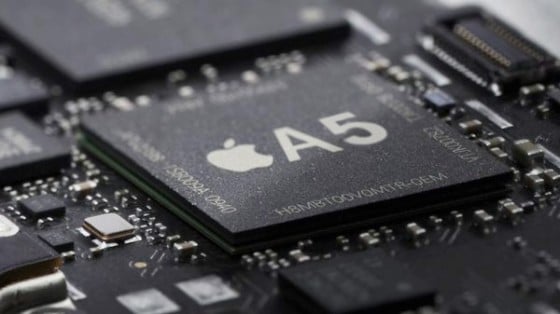Intel May Be Gunning For Apple's Manufacturing Needs
It's only been two weeks since Apple and Samsung jointly sued each other for alleged patent infringement, but relations between the two companies have apparently already turned ice cold. Rumors in April suggested that Apple was discussing an arrangement with TSMC (there's been no official confirmation on either side). Gus Richard, an analyst at Piper Jaffray has since proposed that Intel itself may want a piece of this particular pie.
Richards goes on to note that he expects TSMC to report revenue from Apple-related sales by Q4. Given the time it takes to forge an agreement and port a chip design from one foundry to another, it seems unlikely that Intel would do much manufacturing where the A5 is concerned. Intel, thus far, has only agreed to serve as a foundry for a single, relatively small, company (Achronix); it's made no move to court the larger design firms that companies like TSMC or GlobalFoundries depend on.

Apple's A5, currently manufactured by Samsung
Intel may not be willing to make room for Apple's needs. In order to take advantage of the leading technology Richards refers to, Apple would need to build chips on either Intel's 32nm process or the 22nm technology it's currently working on. Ironically, these are the two production lines Intel is probably least interested in licensing (assuming high volume production). Whatever foundry work Intel does for anyone, it serves its own interests first. A company like TSMC, in contrast, is happy to build parts for two die-hard competitors—it handles both AMD and Nvidia production without a wink.
Apple's decision to use custom-designed ARM processors could also raise a few hackles at Intel. Santa Clara has invested huge amounts of money into developing and scaling Atom into smaller devices; company executives might not be keen on manufacturing what amounts to a competitive product. Ultimately, Intel's decision would depend on how seriously it is about product manufacturing for other companies. Apple's manufacturing needs are significant enough that Intel would likely want agreements in place ensuring that Apple would use certain Intel products (think wireless radios) for the duration of the agreement.
For now, Samsung will remain as Apple's sole supplier, regardless their respective lawsuits.
It makes strategic sense for both companies. The combination of Apple's growing demand and market share in smart phones and tablets gives Intel a position in these markets and drives the logic volume Intel needs to stay ahead in manufacturing. Intel's manufacturing lead gives Apple an additional competitive advantage in these markets and distances it from Asian competitors...it would also serve to weaken Samsung, who is a significant competitive threat to both companies.
Richards goes on to note that he expects TSMC to report revenue from Apple-related sales by Q4. Given the time it takes to forge an agreement and port a chip design from one foundry to another, it seems unlikely that Intel would do much manufacturing where the A5 is concerned. Intel, thus far, has only agreed to serve as a foundry for a single, relatively small, company (Achronix); it's made no move to court the larger design firms that companies like TSMC or GlobalFoundries depend on.

Apple's A5, currently manufactured by Samsung
Intel may not be willing to make room for Apple's needs. In order to take advantage of the leading technology Richards refers to, Apple would need to build chips on either Intel's 32nm process or the 22nm technology it's currently working on. Ironically, these are the two production lines Intel is probably least interested in licensing (assuming high volume production). Whatever foundry work Intel does for anyone, it serves its own interests first. A company like TSMC, in contrast, is happy to build parts for two die-hard competitors—it handles both AMD and Nvidia production without a wink.
Apple's decision to use custom-designed ARM processors could also raise a few hackles at Intel. Santa Clara has invested huge amounts of money into developing and scaling Atom into smaller devices; company executives might not be keen on manufacturing what amounts to a competitive product. Ultimately, Intel's decision would depend on how seriously it is about product manufacturing for other companies. Apple's manufacturing needs are significant enough that Intel would likely want agreements in place ensuring that Apple would use certain Intel products (think wireless radios) for the duration of the agreement.
For now, Samsung will remain as Apple's sole supplier, regardless their respective lawsuits.

